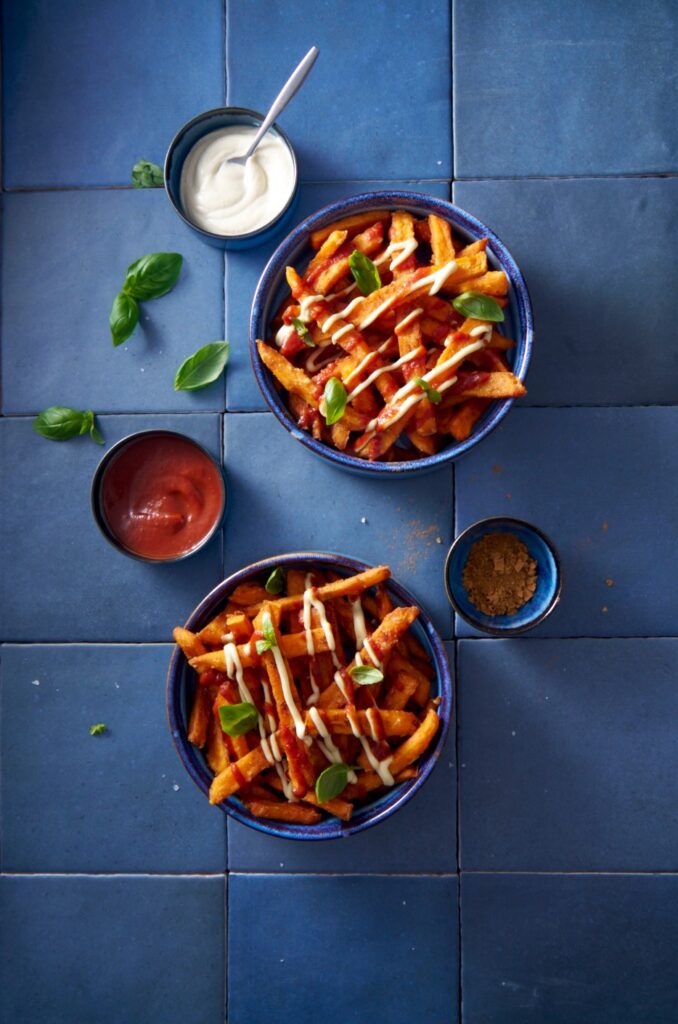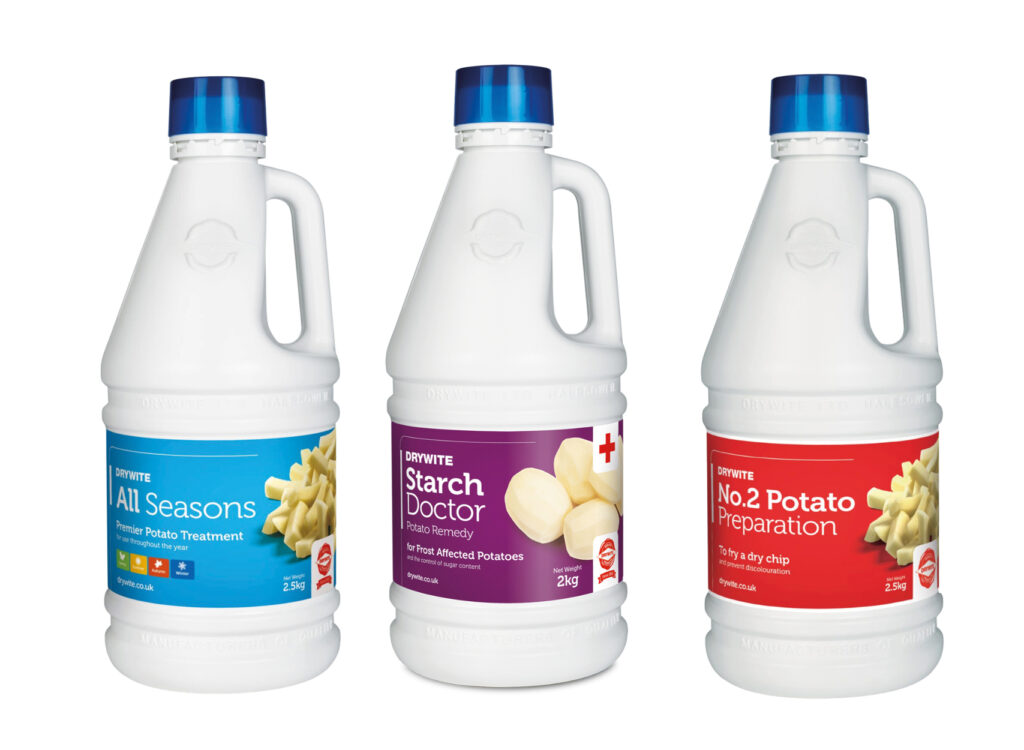Chips are the mainstay of every menu but how they are prepared, cut and served varies hugely, plus they now have to contend with new potato products wanting the spotlight
The UK is a nation of chip lovers, with Brits munching their way through two billion kilos of chips annually, the equivalent of 30kg a head.
While some 40% of that is made up of shop-bought oven chips or ones prepped at home, 35% is from the nation’s fish and chip shops. But not all chip shops serve the same product, scour the UK and there are plenty of operators happy to diverge from the straight cut industry norm chip and offer something different.
Robinsons of Cromford in Matlock, Derbyshire, is one of these as it continues a 70-year-long family tradition of serving crinkle cut chips only.
Carol Robinson, who owns the takeaway with husband Graham, believes hers is one of only two shops that serve crinkle cut chips – the other being Royal Fisheries in Whitby – which gives it a point of difference. “We live in the Peak District where there are endless fish and chip shops, so the fact we do crinkle cut chips we stand out and it is why most of our customers come to us.”
With crinkle cut chips only possible due to a specially shaped blade that is no longer in production, it’s no surprise they are a rare find. It also means Graham has to take extra care to maintain his chipper. “It has to be cleaned down, taken to pieces and put together again at least once a month and, of course, it’s washed out every time we use it,” says Carol.
The only issue Carol occasionally finds is the odd customer thinking the chips are frozen. “I just show them the 20-odd bags of potatoes I have to prep!” she says.
Also doing things differently is Johnny Mac’s in Colchester, Essex, where owner John McNeill can be found hand-cutting up to 60 bags of potatoes a week.
“There are two times I cut potatoes by hand,” he explains. “The first is when the potatoes are small because when they go through the chipper you end up with lots and lots of little bits. If you chop them by hand you can reduce your wastage by up to 20%. The other time is when the potatoes go soft because they can break up, so I Drywite them first and then chop them a little bit bigger.”
With John’s army chef training and his team helping, they can cut a bucket full of chips in less than 30 minutes. “It’s not always about making money but saving money,” says John. “You’ve got to make sure you’re not working for nothing.”


More than just chips
At Gregg and Lou’s in Redruth, Cornwall, chips are joined on the menu by curly fries and mash. While neither hit the profit margins that its chippy chips do, owner Lou Honeywell-Watkins says it gives customers an option of something different and potentially makes them visit multiple times a week. “I feel offering different potato products that don’t take any extra prep are a good add-on,” she says.
Initially, Lou was making mash from scratch but after noticing that not every batch of potatoes was suitable, resulting in an inconsistent end product, she opted for frozen mash from Bookers, which is served in three portion sizes – small, medium and large.
“Customers love the mash and ask us to add cheese to it for cheesy mash and we sell lots of it,” she says.
“Obviously this works out more expensive to use the frozen mash but when you take out the time to boil, mash, add extra ingredients, waste, make sure the consistency is correct, etc., then we feel the frozen mash is definitely the way to go for us and offers peace of mind. No waste and no prep time!”
Their curly fries – from Lamb Weston – are also frozen and Lou has them weighed out into portions ready to fry when requested.
“We find that some customers just come in for curly fries and a curry sauce. Also, we notice that on a big order, there is always a portion of curly fries added, which usually goes with a popcorn chicken or mini fillets.
“We charge £3.75 for these and get about seven portions out of a bag so they have a good markup on them.”
Loaded chips
For some shops, it’s not about serving a different product, but simply serving chips in a different way. Knight’s Fish Restaurant in Glastonbury, Somerset, can dish up to 1,000 portions of fish and chips a week as well as 300-400 portions of chips on their own, whether in a box, a butty or a cone.
More recently it has added loaded pulled pork chips to the menu which are finished with a sprinkling of mature Cheddar. It takes Knight’s standard portion of chips from £3 to over £7. Kevin Mitchell, who owns the business with wife Charlotte, says for a business like his, it’s a huge add-on sale to a standard portion of chips.
There’s also a LUX option where chips are covered in salt, garlic and rosemary, tossed in a bowl and served in a standard chip box with a drizzle of garlic olive oil and mayonnaise.
“It’s very popular,” says Kevin. “And again, where the fish and chips business over the last 12 months has been hit with huge price increases in fish and potatoes, it gives us the ability to move the product to a different level and it helps improve our margin.”
If you are thinking about adding more potato options to your menu, Kevin has a word of warning. “When you’re thinking about a new product, you’ve got to be able to do it in the busy months as well as the quiet months. So for us, we’re always thinking can we do it at peak times when we’ve got a queue out the door and halfway down the street?”
For inspiration, look on the internet for the latest trends, but also speak to suppliers and wholesalers as many have recipe ideas and product samples that they will only be too happy to share with you.
THE SWEET OPTION

According to Lamb Weston, 1-in-4 consumers perceive sweet potato fries to be healthier than regular fries, making them a perfect choice for customers looking for healthier menu options. Naturally sweet with a fluffy inside and a crispy coating, Lamb Weston Sweet Potato Fries are available in 6×13 cut size for consistent frying and portion control.
Lamb Weston 0800 963962 www.lambweston.eu/uk
KEEP QUALITY HIGH WITH DRYWITE

Drywite offers a trio of products designed to tackle some of the most common potato problems, helping friers to serve the best possible chips all year round.
Developed to address seasonal variations in the quality of potatoes, whether it’s winter or summer, old or new potatoes, Drywite All Seasons eliminates excess starch and sugar leading to a superior end product.
For frost-affected potatoes and the control of sugar content, Starch Doctor prevents after-cooking darkening, while Drywite Powder Formula No.2 Potato Preparation prevents discolouration in fresh cut chips and peeled potatoes, keeping them fresh for up to 48 hours and reducing wastage.
Drywite 01384 569556 www.drywite.co.uk








